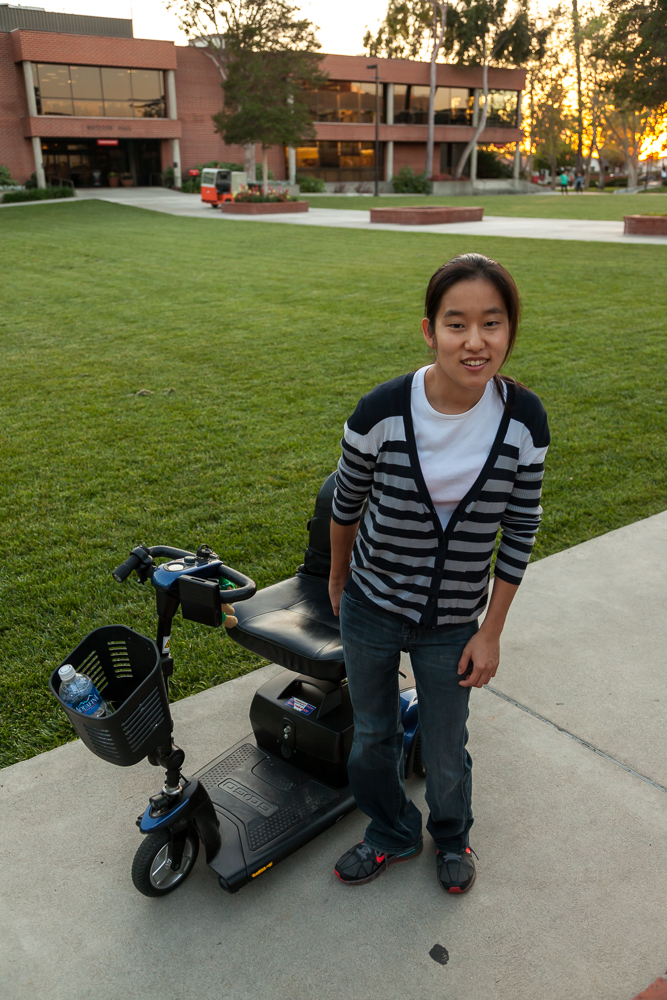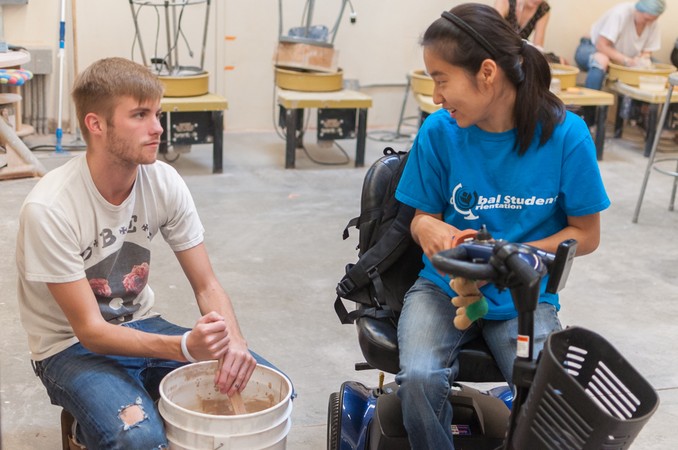Kelly Yang stands out among Biola students. She has cerebral palsy and must rely on a scooter to get around campus. At Biola, where few students have similar physical impairments, her experience is uncommon and this stark distinction has resulted in a unique experience of and perspective on many aspects of the school.
Yang, now a senior psychology major, arrived at Biola four years ago in fall of 2011 from Guam, where she was born and raised. Unlike most incoming freshmen, she had mixed feelings about attending Biola, ranging from resentment to excitement.
“I didn’t feel like I wanted to come to Biola because I had been in a Christian private education system for 14 years of my life and experienced suffering, oppression and loneliness,” Yang said.
Eventually, Yang gave into the hope of any college freshman, anticipating discovering more about herself and making friends.
“Like any other 17 or 18 year old, I came with expectation, excitement. College is the big day, a turning point in your life, these people you meet will be lifelong colleagues, friends and acquaintances,” Yang said.
ADVOCACY FOR STUDENTS
Yang connected with former International Student Director Ivan Chung up arriving at Biola and partnered with him on advocacy for students with disabilities and community development.
“Growing up with a form of cerebral palsy, Kelly has faced many physical challenges during her formative years, as well as her years at Biola. Discovering more than a few accessibility limitations of campus, Kelly advocated for as many facility additions as she could for Biola individuals with physical disabilities,” said Chung.
Yang’s experiences with departments, faculty and students who do not understand how to accommodate someone with a disability have involved complications and misunderstanding.
HOUSING ACCESSIBILITY ISSUES
Yang’s difficulty finding appropriate housing at Biola began early her freshman year, when she was initially placed in Hope Hall. Here she faced accessibility issues including communal-style bathrooms located far down the hall from her room.
“They have a quote-unquote accessible shower stall, yet how do you expect a student with a scooter to bring that scooter in when she has to go through two doors. It was problematic,” Yang said.
Realizing these issues, Yang needed to move dorms. Eventually the housing department suggested Sigma Chi, because of the suite-style bathrooms that allowed more access and privacy.
The room situation was better, but Yang still faced an accessibility issue since she could not open the front door, which at the time was not automatic. Yang struggled getting through the door and would get wedged between the door and the doorway.
“Being on a scooter has its pros and cons, but definitely one of the cons is entering doors. If the doors do not open for me, who’s going to open it?” said Yang.
She approached the Resident Director early on and asked if they would install a button on the door of the main entrance. Her request was initially denied. Yang then partnered with Chung, who advocated on her behalf.
“This door was not an option, it was a need. The reason it hurts so bad to not be able to go in and out of those doors is because it screams out to me, ‘Kelly, you’re not welcome here. Only people who are abled are allowed in this building,’” explained Yang. At the end of her first semester at Biola, the automatic door was finally installed.
BRINGING ACCESSIBILITY ISSUES TO LIGHT
Yang compares finding a needle in a haystack to finding instances of exception in university policy to be able to get what she needs.
“It’s all about self-advocacy, so if I don’t say anything, nothing will happen,” Yang said. “This is a problem because although policies are meant to maintain order and structure, they present problems to students with disabilities who are not prepared to articulate themselves.”
Chung explained that Yang has developed communities on campus to support each other in the midst of their physical challenges, while gently and assertively bringing to light accessibility issues on campus and helping the Biola community become more aware of physical disability challenges.
EXPERIENCES WITH STUDENTS
Students’ attitudes toward disabled students range from confusion to pity to apathy, said Yang.
For example, Yang presented an experience she had with a fellow student just a couple weeks ago.
“I met a guy the other day, he came up to me and said, ‘Hi, I’m so-and-so, may I ask you a question?’ I knew what was coming next,” said Yang.
The student said, “May I ask why you are on a scooter?”
The student explained that he felt God had called him to go to her and Yang debated how to respond. She considered either driving away or using this as an opportunity to change his perspective. Yang decided to stay and explained to him she was on a scooter because she has a disability that does not allow her to walk well.
He responded with another question: “May I ask what it is?”
Yang told him she had cerebral palsy and he followed with yet another question.
“I knew exactly what this next question would be too,” said Yang. He asked: “Can I pray for you?”
Yang has become resigned to these types of encounters, and explained to him that she appreciates his heart, but if one really wants to love somebody there is a proper sequence to approaching someone with a disability.
“You need to earn my trust and get to know me first. I might naturally just tell you about my disability, because it is part of my story. It is not inviting for a person with a disability to be asked what is wrong with them, ‘what they have.’ It makes me afraid because you just want to know what is broken and obvious about me, and it brings out a inferiority-superiority complex,” Yang said, adding that these good intentions end up being hurtful.
“Do you see the problem?” Yang asked him, and he responded, “Yes, I do.”
One down, a million more to go, said Yang. The student left without praying. He understood the situation because she took the time to gently explain to him how she felt.
“Get to know me, sit with me in this, see it through my eyes. Before you know it, you will understand how I need help, by living it out with me,” said Yang.
SEEKING TO UNDERSTAND
Yang explained this experience is different for every individual with a disability — people with disabilities do not have a box to fit in, it is more like a polygon. If your heart is not transformed in the process of seeking to understand how to help someone, you have missed the point, she said.
This idea of supporting students in this way applies to administration, departments and faculty as well as students, Yang said.
Yang has a vision for Biola. In retrospect, she sees ways the university needs to improve, both in technical enhancements and, more importantly, in compassion.
“I want Biola to be an institution that promotes inclusion — meaning that all students are served, helped and cared for, so that it is not a matter of the student advocating for him or herself only, not 100 percent that students burden, but that the faculty and staff would come along students and advocate as well, ask and help,” Yang said.








